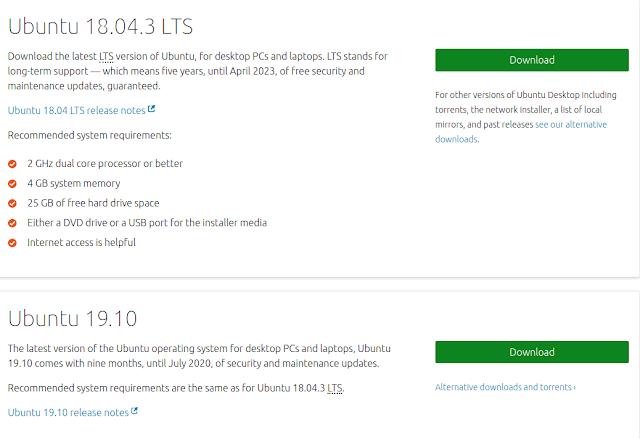If you have just heard about Ubuntu Linux and want to try it out, chances are you are all confused about a lot of things. This post will explain some of those FAQ - Frequently asked questions often asked about Ubuntu Linux.
1) What partition should i install Ubuntu Linux ?
Ubuntu Linux uses EXT4 formatted partition. So, you can't directly install it on to your regular NTFS or FAT32 partitions. The mount point the operating system install on to is denoted as '/' ( root partition ).
Generally, there are two versions of Ubuntu available to download - LTS version and a regular version with latest software and kernel. LTS means long term support - Five Years of updates will be provided. Regular version with latest software comes with Nine Months of support only. However, you can always upgrade it to the next version and continue to get new softwares and updates without any issues.
Yes. Ubuntu can mount NTFS and FAT 32 formatted Drive. You can find it under 'Other Locations' in File Explorer. Click on it and it will mount the partition. You can copy, paste and delete files as well. If a Drive is encrypted, then you wouldn't be able to access it via Ubuntu Files.
1) What partition should i install Ubuntu Linux ?
Ubuntu Linux uses EXT4 formatted partition. So, you can't directly install it on to your regular NTFS or FAT32 partitions. The mount point the operating system install on to is denoted as '/' ( root partition ).
2) I see two different versions on Ubuntu Download website. Which one should i download and Install ? LTS ( 18.04 currently ) or the other one ( 19.10 currently ) ?
Generally, there are two versions of Ubuntu available to download - LTS version and a regular version with latest software and kernel. LTS means long term support - Five Years of updates will be provided. Regular version with latest software comes with Nine Months of support only. However, you can always upgrade it to the next version and continue to get new softwares and updates without any issues.
So if you are wondering which one to get for your Desktop, get the latest version instead of LTS. If you are installing Ubuntu at Work, then grab the LTS version as it is more stable and can get longer updates without needing to upgrade.
Some Useful Tutorial Links.
How to Burn a Ubuntu Bootable CD on Windows? ( check here )
How to Create a Bootable Ubuntu Live USB Drive on Windows ? ( check here )
Detailed - How to Install Ubuntu Desktop ? ( check here )
3 ) While Installing Ubuntu, how much drive space should i allocate for Ubuntu main partition ?
5GB is the minimum storage needed to install Ubuntu. However, that's not a good amount at all. Give it at least 25GB of storage space. I have mine at 52GB.
4) What is meant by Ubuntu Live CD ?
Live CD allows you to try out Ubuntu on your Laptop or Desktop without installing. This come in handy when you are trying to install it on older laptops. When you boot from a bootable Ubuntu CD or USB Stick, you are given two option - Try Out Ubuntu without Installing or Install Ubuntu. I would recommend you try out Ubuntu first and see if everything is working properly, then go ahead with the install.
5) If i install ubuntu will it delete windows 10 ?
No. Ubuntu installs Grub Bootloader, which lets you choose which OS to boot to during startup. Both Windows 10 and Ubuntu Linux will be listed on it. Choose the one you want and it will boot up without any issues.
If you accidently install Ubuntu on to the Windows 10 Drive, then, Yes, you will lose Windows 10 or any OS that's receding on that particular drive.
6) Can i see my Windows 10 Drives on Ubuntu ?
Yes. Ubuntu can mount NTFS and FAT 32 formatted Drive. You can find it under 'Other Locations' in File Explorer. Click on it and it will mount the partition. You can copy, paste and delete files as well. If a Drive is encrypted, then you wouldn't be able to access it via Ubuntu Files.
If you have any more questions related to Ubuntu, feel free to post it under the comments here. I will update this post with more FAQ questions about Ubuntu.
7) Is it true there are NO Viruses in Ubuntu Linux
That statement is half true. There are viruses made for Linux, but they normally can't do much damage like they do on Windows systems. Also, the viruses made for Windows can't be run on Ubuntu. So Yes, Ubuntu Linux is much safer to use without an Antivirus software.
7) Is it true there are NO Viruses in Ubuntu Linux
That statement is half true. There are viruses made for Linux, but they normally can't do much damage like they do on Windows systems. Also, the viruses made for Windows can't be run on Ubuntu. So Yes, Ubuntu Linux is much safer to use without an Antivirus software.

Comments
Post a Comment